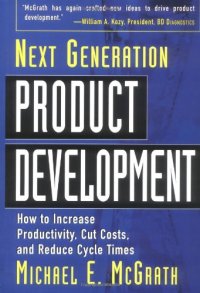
Ebook: Next Generation Product Development : How to Increase Productivity, Cut Costs, and Reduce Cycle Times
Author: Michael McGrath
- Genre: Education
- Year: 2004
- Publisher: McGraw-Hill
- Edition: 1
- Language: English
- chm
The author, Mr. McGrath, has served as a member of the board of directors of i2 Technologies, since August 2004 and as its chief executive officer and president from February 2005 through July 2007. Before, he was active as a consultant to technology-based companies, and had co-founded IDe, a software development company.
The book is basically focussed on the description of what McGrath calls a "DCM" (development chain management) system, which would be the next-generation of product development management tools. While the content is very close to real problems in R&D, and the problems and solutions described feel very actual and real, the book as a whole leaves me very unsatisfied.
Why?
When McGrath proposes ways of addressing problems, he remains quite high-level on how this will look in practice or exactly how the "DCM" system would work in detail.
There is not a single real life example in the book. To show the possible application, a fictive company is used as an example. It got to the point of being embarassing when it is described how this fictive company made great improvements (in percentage with numbers) using this fictive DCM system.
The book really focusses on how some analytical numbers can be shared across stages of development and different teams. This is a necessary but incomplete base for "next generation" product development. Data and numbers can provide insight and guidance (and are undeniably a needed step), but the human dynamics should be as important. If you have some experience, you know e.g. that some resource allocations cannot be decided upon through spreadsheet analysis. People are not interchangeable Lego blocks.
While reading through this book, I continuously had the strong impression that I was reading a whitepaper or requirement document from a software company. As I often do, I run a quick background check on the author, and found that in before starting at i2, Mr. McGrath had co-founded IDe. IDe's business was to develop integrated solutions for Development Chain Management. (I couldn't find traces of this company's existence any more so I guess it doesn't exist any more). Was this book the blueprint for that company? Maybe, possibly.
Any case, I have spent 39,95 USD and have read through 360 pages and feel both of these are too high compared to the value I got out of the book in terms of practical use, innovative ideas and fun.
The book is basically focussed on the description of what McGrath calls a "DCM" (development chain management) system, which would be the next-generation of product development management tools. While the content is very close to real problems in R&D, and the problems and solutions described feel very actual and real, the book as a whole leaves me very unsatisfied.
Why?
When McGrath proposes ways of addressing problems, he remains quite high-level on how this will look in practice or exactly how the "DCM" system would work in detail.
There is not a single real life example in the book. To show the possible application, a fictive company is used as an example. It got to the point of being embarassing when it is described how this fictive company made great improvements (in percentage with numbers) using this fictive DCM system.
The book really focusses on how some analytical numbers can be shared across stages of development and different teams. This is a necessary but incomplete base for "next generation" product development. Data and numbers can provide insight and guidance (and are undeniably a needed step), but the human dynamics should be as important. If you have some experience, you know e.g. that some resource allocations cannot be decided upon through spreadsheet analysis. People are not interchangeable Lego blocks.
While reading through this book, I continuously had the strong impression that I was reading a whitepaper or requirement document from a software company. As I often do, I run a quick background check on the author, and found that in before starting at i2, Mr. McGrath had co-founded IDe. IDe's business was to develop integrated solutions for Development Chain Management. (I couldn't find traces of this company's existence any more so I guess it doesn't exist any more). Was this book the blueprint for that company? Maybe, possibly.
Any case, I have spent 39,95 USD and have read through 360 pages and feel both of these are too high compared to the value I got out of the book in terms of practical use, innovative ideas and fun.
Download the book Next Generation Product Development : How to Increase Productivity, Cut Costs, and Reduce Cycle Times for free or read online
Continue reading on any device:

Last viewed books
Related books
{related-news}
Comments (0)








